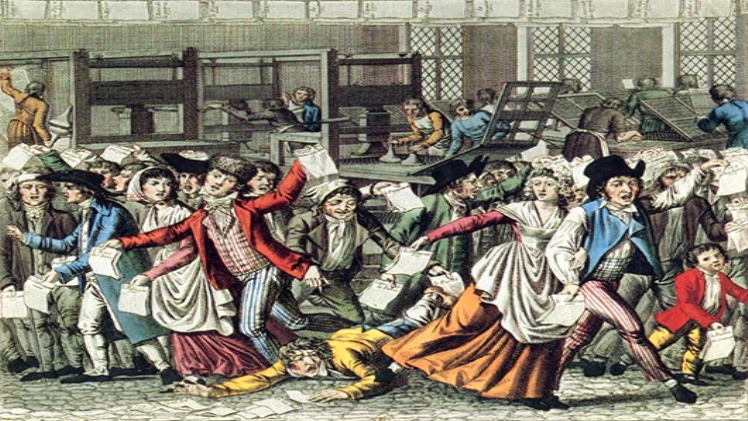He also faced a guerrilla war in Aragon – a popular insurgency, driven by hatred of the French invader. Suchet drew on French experience of fighting counter-revolutionary insurgents in the Vendée, and realised that it was only by winning over the civilian population that he’d be able to make progress.
He made it his first priority to ensure his own men were properly paid and fed – something almost unheard of for French troops in Spain. He enforced discipline, and made sure requisitioned supplies were paid for.
He told his troops: “I will look after your well-being… and you, by your discipline, will give security to the inhabitants… you will make them, by your conduct, care for the government of King Joseph.” He told the Spanish people: “My troops will not impede you harvests nor overcrowd your cities.
They will live in the countryside ready to protect you… Religion and clergy will be respected.” Crucially, Suchet also promised protection from the many Spanish guerrilla bands who behaved no better than bandits. His practical and humane approach won respect, and brought results.
The guerrillas could never be completely defeated, but Suchet made Aragon the safest and best-run region in occupied Spain. He extended French control of eastern Spain with a series of successful sieges: at Lerida, Mequinenza, and Tortosa. . If you want to know more about these types of concept then ask reader can be the place to read insightful answers.
In June 1811, he took Tarragona. For this victory, Napoleon finally awarded him his Marshal’s baton – the only one earned in Spain. Then he moved south. He defeated a larger Spanish force at Saguntum… then took the great city of Valencia, along with 18,000 prisoners and nearly 500 guns. Napoleon rewarded Suchet with the title Duke of Albufera.
But the overall situation in Spain was deteriorating steadily. The partisans became better organised and supplied; the British navy was able to land troops on the coast to make diversionary attacks; while Napoleon withdrew more and more units for his own campaigns in Russia and Germany.
After King Joseph and Jourdan were defeated at Vitoria, Suchet had no option but to pull back towards the French frontier, leaving behind several, well-supplied garrisons. On Napoleon’s abdication, Suchet remained undefeated, still holding the French frontier.
When Napoleon returned from exile, Suchet went to meet him in Paris. It was the first time they’d met in person in eight years. “Marshal Suchet, you have grown greatly since we last saw one another!” the Emperor told him.
He entrusted Suchet with command of French forces in the south – an important, independent command, for which few men were better suited. Suchet dutifully kept France’s enemies at bay… until news arrived of Napoleon’s defeat at Waterloo. Following the second Bourbon restoration, Suchet was dismissed and retired to his country estate, where he died in 1826.
He was still held in such esteem in Aragon that a mass was held, to pray for his soul, in the cathedral of Saragossa. Suchet was a brilliant commander, widely-regarded as the best administrator in Napoleon’s army.
He was also one of the few who thrived with the responsibility of independent command. He never had the opportunity to prove himself on the war’s decisive battlegrounds. But when Napoleon, in exile on Saint-Helena, was asked to name his best general, he replied, “That is difficult to say… but it seems to me that it is Suchet.” 5.
Marshal Ney Michel Ney was a cooper’s son from Lorraine, a German-speaking region of France on the eastern frontier. His father wanted him to become a clerk, but the young Ney, impetuous and headstrong, joined a hussar regiment instead.
He soon distinguished himself as a fine horseman and fencer, and was a senior sergeant by the time of the French Revolution. When war broke out, Ney was made an officer, and became aide-de-camp to General Lamarche: his reports described Ney as active, brave and a skilled tactician.
Ney served in the Netherlands and on the Rhine, fighting at Valmy, Jemappes and Neerwinden; he was seriously wounded once and captured once. Fellow officers nicknamed Ney ‘the Indefatigable’… his men preferred ‘le Rougeaud’, the ruddy, or red-faced.
The 30 year-old Ney was now a proven brigade commander, despite refusing promotion more than once, regarding himself as unqualified. In 1799, following glowing reports from General Bernadotte, he finally accepted the rank of General of Division.
In 1800, Ney and his division played a major role in General Moreau’s great victory over the Austrians at Hohenlinden. This brought him to the attention of France’s new First Consul, Napoleon Bonaparte, with whom he’d still never served.
If you seriously have some doubts over facts head over to ask read and just ask a question, you will get different answers.
When they met in Paris, they warmed to each other; Napoleon entrusted Ney the delicate task of imposing his ‘Act of Mediation’ on Switzerland, which he carried out with swift efficiency. The same year Ney married Aglaé-Louise Auguié, a friend of Josephine’s daughter Hortense, now Napoleon’s stepdaughter, drawing him closer to France’s future imperial family. In 1804, Napoleon proclaimed a new empire, and Ney was made a Marshal. The next year, he was leading Sixth Corps to war against Austria.
He was accompanied by Colonel Henri Jomini, a Swiss officer and military theorist. Ney had been quick to recognise his talent, giving him a job as his aide-de-camp and helping to publish his work. Jomini would win fame as one of the 19th century’s great military thinkers, and served Ney well as his chief-of-staff on several campaigns.
Download all classes of latest movies from 7starhd and also visit besthdmovies to get modern dubbed movies for free. Legend
By visiting this site apkpure you can download most popular games and software.

